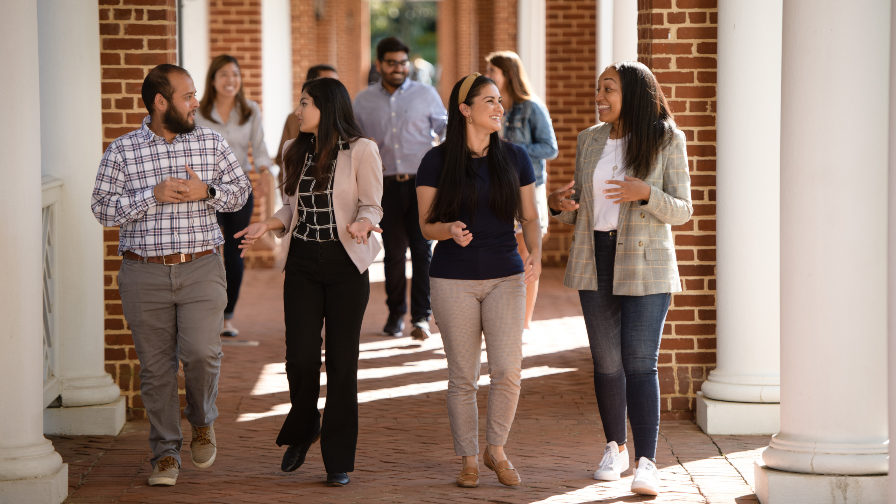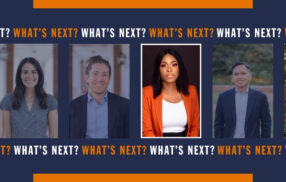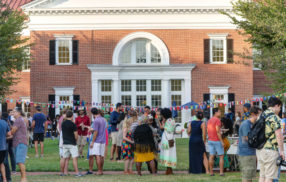
‘Two Years of Business School Is Extreme Self-Reflection:’ Insights From the Darden Diversity Conference
By Jen A. Miller
The University of Virginia Darden School of Business held its annual Darden Virtual Diversity Conference in early November, offering a global audience the opportunity to learn more about how the School embraces and celebrates diversity and inclusion. Conducted virtually, the event drew prospective students to meet with faculty, alumni, current students and staff to learn more about Darden and to also engage in discussions about the road to a more diverse, inclusive and equitable business world.
Over two days, prospective students met with members of affinity clubs, listened to Admissions officers, talked to current students in a lively “ask me anything” panel, and participated in a mock case that showcased how the Darden case method and classroom helps to bring in different perspectives and experiences while solving business problems — in class, and then in the world.
Building a Diverse Academic and Business World
In a fireside chat, prospective students gleaned perspective on how the focus on diversity and inclusion in business and in academia has changed over time.
Alex R. Picou (MBA ’89), chair of the Dean’s Diversity Advisory Council and managing director for J.P. Morgan Private Bank, spoke of the “3 E’s” that have guided recent inclusion work at Darden:
- Entry, “as we focused on broadening the funnel of diverse talent backgrounds,” he said.
- Experience, to make sure students feel valued, included, and able to thrive, in and out of the classroom
- Exit, to ensure that alumni are engaged in helping the students who come behind them
Professor Martin Davidson, Darden Senior Associate Dean and Global Chief Diversity Officer, described his experience as the first Black tenured faculty member at Darden. He spoke about how Darden’s faculty is expanding and has become younger, more international and more diverse during his time at the School.
He added that the increasingly varied perspectives were important for the Darden community, and valuable to the world of practice. To that end, Professor Melissa Thomas-Hunt, described recently returning to Darden after serving as the head of global diversity and belonging at Airbnb.
“I’m grateful for the opportunity to come back to the Darden School and really re-engage with my passion of student pedagogy and researching and teaching and learning,” she said. “I feel like I’ve been given a gift.”
Thomas-Hunt underscored the importance of how the case method reinforces the principals of diversity and belonging.
“We are only as good as our experiences … and so we come into any environment with preconceived notions of who knows what and who doesn’t know what,” she said.
The case method challenges those notions, and teaches students the importance of learning about what comes from those different perspectives. The Darden platform is “systematic in curating things across the class.”
There has long been a business case for diversity because companies “do better when you have a diverse array of perspectives,” she said. “Why would you ever choose to not have a portion of the population represented” in your organization, she asked. “Why would you foreclose the opportunity to be in touch with … the cultural richness” around you?
Recent Alumni on What an MBA Can Do
In an alumni panel, recent Darden alumni spoke about how the school prepared them for the roles they have today.
“The classroom case method experience was one of the most formative experiences for me,” said Gen Izutsu (MBA ‘15), director of innovation and marketing for Danaher Corporation. “I thought I had to have all my ideas fully baked,” he said, and it took time for him to come to the realization that not knowing is okay, and “being comfortable with having a big group ask the big questions.”
Catherine Manfre (MBA ‘14), partner at the Boston Consulting Group (BCG), agreed. “Darden does a really fantastic job preparing you how to think about ambiguous problems and work with other people to solve ambiguous problems,” she said, adding that Darden students who join BCG “have the raw business skills and are able to hit the ground running.”
Ron Cook (EMBA ‘20), CFO for Peebles Corporation, said that hearing from other people and working with students from different backgrounds made him “think about how folks think about certain issues,” he said, and that it helps him “question everyone from my kids to my business partners to targets we’re evaluating.”
The alumni also talked about how Darden helped them figure out what they wanted to do with a business degree.
“Two years of business school is extreme self-reflection,” said Christina Gonsalves (MBA ‘19), product marketing manager for Microsoft. Students in Darden classrooms are “creating a new foundation of what your leadership style is going to be and who you’re going to be at the next part of your career.
When Manfre applied to business schools, she said she “felt a lot of pressure to have an answer to the question of what do you want to do after your MBA and with the rest of your career,” she said. “Careers are long. An MBA opens up a lot of doors that wouldn’t have been open to me if I hadn’t come to Darden. The thing you do out of your MBA is not necessarily the thing you’re going to do for the rest of your life.”
The degree, she said, allows for flexibility.
The University of Virginia Darden School of Business prepares responsible global leaders through unparalleled transformational learning experiences. Darden’s graduate degree programs (MBA, MSBA and Ph.D.) and Executive Education & Lifelong Learning programs offered by the Darden School Foundation set the stage for a lifetime of career advancement and impact. Darden’s top-ranked faculty, renowned for teaching excellence, inspires and shapes modern business leadership worldwide through research, thought leadership and business publishing. Darden has Grounds in Charlottesville, Virginia, and the Washington, D.C., area and a global community that includes 18,000 alumni in 90 countries. Darden was established in 1955 at the University of Virginia, a top public university founded by Thomas Jefferson in 1819 in Charlottesville, Virginia.
Press Contact
Molly Mitchell
Associate Director of Content Marketing and Social Media
Darden School of Business
University of Virginia
MitchellM@darden.virginia.edu





